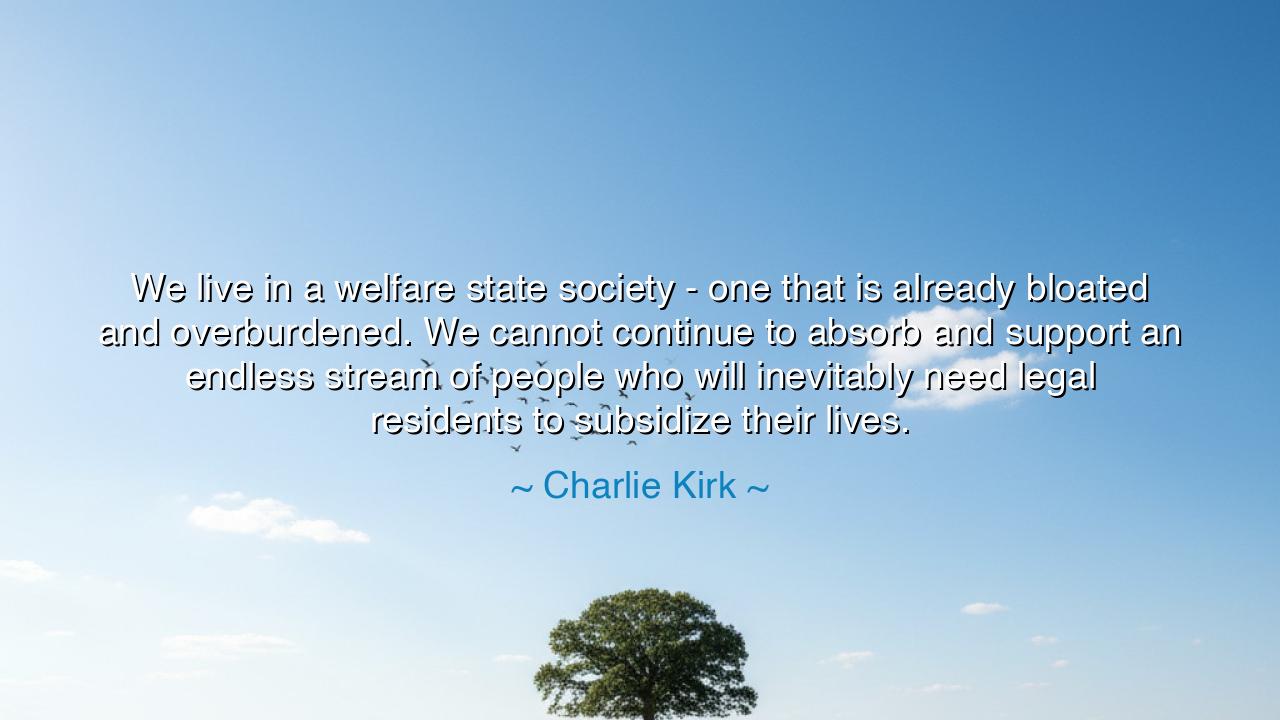
We live in a welfare state society - one that is already bloated
We live in a welfare state society - one that is already bloated and overburdened. We cannot continue to absorb and support an endless stream of people who will inevitably need legal residents to subsidize their lives.






Hear the words of Charlie Kirk, who, in the spirit of warning, declared: “We live in a welfare state society – one that is already bloated and overburdened. We cannot continue to absorb and support an endless stream of people who will inevitably need legal residents to subsidize their lives.” These words ring with urgency and conflict, for they touch upon one of the great struggles of our age: how a nation, bound by compassion yet limited in resources, is to balance generosity with survival, and hospitality with responsibility.
For what is a welfare state, if not a system born of noble intention, where the strong lift the weak, where the wealth of the many sustains the suffering of the few? Such a system can be a blessing, a shield against hunger, sickness, and despair. Yet, as Kirk reminds us, it can also become bloated and overburdened, strained when the need outpaces the ability to give, when the compassion of a people collides with the weight of reality. It is then that nations tremble, and voices rise asking: how much more can we bear?
This question is not new. In the ancient days of Rome, grain subsidies fed the poor masses of the city, sustaining them in times of hardship. At first, it was a measure of mercy. But over generations, as Rome expanded and migrants poured into the capital, the system grew vast and costly. Some historians argue that these subsidies, once a gift, became a burden that drained the treasury and weakened the civic spirit. Thus Kirk’s words echo an old warning: that even noble systems may falter if stretched beyond their means.
Yet, history also shows another truth. In the aftermath of the Second World War, nations of Europe, scarred by destruction, built strong welfare states to heal their wounded societies. Refugees poured across borders, displaced and broken, and though the burden was heavy, their inclusion rebuilt the continent. These systems, though strained, became symbols of solidarity and human dignity. Thus we see the paradox: welfare can be both a weight and a foundation, both danger and salvation.
Kirk speaks particularly of immigration, the “endless stream” of those who seek shelter and opportunity in a land of promise. He warns that if too many come who depend upon aid, the cost will fall upon the shoulders of legal residents, and resentment will grow. It is a vision of strain and fracture, a fear that compassion, unchecked, may unravel the bonds of community. His words reflect the ancient tension between the stranger who seeks welcome and the citizen who fears decline.
What lesson, then, must we draw? It is this: nations must balance compassion with wisdom, generosity with sustainability. To welcome the stranger is noble, but it must be done with foresight, with systems strong enough to endure, with policies that encourage contribution as well as support. To ignore the limits of resources is folly, but to shut the door completely is cruelty. The path of wisdom lies in balance, where justice to citizens and mercy to newcomers meet.
Therefore, O listener, take these words not as a command to harden your heart, nor as a call to reckless giving, but as an exhortation to think deeply and act justly. Support systems that help the vulnerable rise into strength, rather than remain in dependence. Advocate for policies that both honor compassion and preserve stability. Do not despise the stranger, but also do not ignore the strain upon your own household, for both truths must be held together if a society is to endure.
So let the words of Charlie Kirk be heard as a challenge: a welfare state cannot bear endless weight, yet neither can a society survive without mercy. Seek, then, the path of wisdom between the two—where compassion is real, but responsibility guides it. For only in balance shall a nation remain both just and strong, both merciful and enduring.






AAdministratorAdministrator
Welcome, honored guests. Please leave a comment, we will respond soon